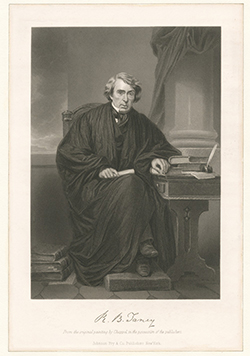Grant-funded cooperative will feature UWF faculty Taney research
January 30, 2020 | Brandy Gottlieb | casshcommunications@uwf.edu

Roger Brooke Taney (1777 - 1864) played a significant role in shaping American politics for more than three decades. UWF faculty research on Taney’s contributions will be made available on an open-source digital platform. This has been made possible, in large part, to a $1 million, three-year grant from the Andrew W. Mellon Foundation and the National Historical Publications and Records Commission (NHPRC).
The work of UWF’s Dr. David Ramsey, associate professor of government, and Dr. Kelly Carr, assistant professor of communication, is one of four collections featured in the Primary Source Cooperative at the Massachusetts Historical Society.
Ramsey and Carr are editors of “The Papers of Roger Brooke Taney.” Their combined research investigates Taney’s influence in shaping the United States’ political landscape.
The Cooperative is an open-source, digital collection of primary sources focusing on the elements of reform and revolution that reshaped 19th century America.
Of their work, Carr says, “Dr. Ramsey and I are thrilled to be part of this grant, the goal of which is not only to publish our own project, but also to build a sustainable model of digital edition publication for other scholars of archival records. We think that this fills a significant need in the age of the digital humanities.”
Q&A with Ramsey and Carr
In a Q&A, Ramsey and Carr give insight into their research and this transformative collaboration.
Q. How do digital technologies contribute to the rise of the digital humanities?
A. Digital humanities embraces the use of digital technologies to forward both the content and goals of the humanities disciplines. This happens through digital publication, digital collaboration, and crowd-sourced information gathering and analysis. The digital humanities make it possible for larger audiences to engage with primary source historical materials through their internet browsers, without ever having to set foot inside a research library.
Q. Who was Roger Brooke Taney and what was his contribution to American politics?
A. Taney played a significant role in shaping American politics for much of the nineteenth century. He served first as U.S. attorney general, then as treasury secretary under President Andrew Jackson. Jackson nominated Taney to fill the vacancy created by Chief Justice John Marshall on the Supreme Court. Taney served as chief justice of the Supreme Court for more than 28 years, a tenure in office second only to the great Chief Justice Marshall who had preceded him. The first stage of “The Papers of Roger Brooke Taney” features letters from Taney's time as attorney general and treasury secretary during President Jackson's Bank War.
Q. What information is included in this installment?
A. In this first installment of the larger project, we will publish 500 verified and annotated transcriptions of manuscripts pertaining to Taney’s involvement in President Jackson’s Bank War, including two lengthy autograph manuscripts providing extended analyses of his public and private conduct during this period—Taney’s Bank War Manuscript and Account of His Relations with Thomas Ellicott in the Bank War.
Q. How will your project-- “The Papers of Roger Brooke Taney”-- contribute to a greater understanding of the forces that shaped American politics?
A. Calls for economic reform are not new in American politics--they have been with us from the beginning. Series I of the project focuses on Taney’s involvement in the Bank War. The correspondence included in this edition will allow users to examine the inner workings of Jackson’s cabinet as they developed their project to decentralize the national system of banking and finance. It will also provide users with examples of how Taney engaged with his critics, who sought to preserve the Bank of the United States, in order to secure his legacy as a democratic reformer of some consequence. Contemporary political discourse includes many who express concern that a centralized system of banking and finance, when combined with a handful large multinational corporations, has the potential to corrupt our political process. By making these letters readily available to a wider audience of users, we hope to encourage further study of the progress of economic and political reform during the nineteenth century. Such a study may help to better frame these concerns, offering a window into the utopian strategies and goals of reformers. Additionally, it offers insights into the utility of champions of the status quo using pragmatic, incremental reform to stave off calls for more fundamental or revolutionary change.
Q. How does this initiative contribute to greater access to public knowledge?
A. We aim to engage a broader public in conversations about political reform in American history. The Primary Source Cooperative at MHS will make scholarly digital editions (well-sourced and contextualized archival materials) freely accessible to the general public, rather than placing these materials behind a paywall. It takes this type of grant money to make that happen! Usually, endowed private institutions or Research 1 institutions are the only places with enough money and digital infrastructure to support such an undertaking. Even then, users are usually required to pay for access. Our partnership with the Massachusetts Historical Society is trying to improve upon that model and expand public access.






